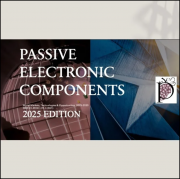
|
시장보고서
상품코드
1722932
수동 전자부품 시장 규모, 점유율, 동향, 예측 : 유형별, 최종 이용 산업별, 지역별(2025-2033년)Passive Electronic Components Market Size, Share, Trends and Forecast by Type, End Use Industry, and Region, 2025-2033 |
||||||
수동 전자부품 세계 시장 규모는 2024년에 398억 6,000만 달러에 달했습니다. 향후 IMARC Group은 2033년에는 572억 3,000만 달러에 이르고, 2025-2033년 3.90%의 연평균 복합 성장률(CAGR)을 보일 것으로 예측했습니다. 현재 북미가 시장을 독점하고 있으며, 2024년 시장 점유율은 35.8% 이상에 달했습니다. 이 시장은 주로 스마트폰, 웨어러블 등 소비자 전자제품 수요 증가, 전기자동차 및 첨단 자동차 시스템의 채택 확대, 에너지 생산 및 저장 시스템의 효율적인 에너지 관리와 신뢰성을 필요로 하는 재생에너지 인프라의 확대에 의해 주도되고 있습니다. 견인하고 있습니다.
수동형 전자부품이란 전력을 발생시키지 않고 전력을 얻을 수 없는 전기 부품을 말합니다. 커패시터, 저항기, 변압기, 인덕터, 코일로 구성됩니다. 탄탈륨, 세라믹, 알루미늄 전해, 종이, 플라스틱 필름 등으로 제조됩니다. 수동 전자부품의 에너지를 흡수하여 작동에 전력을 필요로 하지 않습니다. 컴퓨터, 가전제품, 스마트폰, 게임기 등 다양한 전자기기에 많이 사용되고 있습니다. 수동형 전자부품은 신뢰성이 높고, 설계가 용이하며, 비용 대비 성능이 우수하고, 전원이나 증폭 소자가 필요 없고, 큰 전압 전류와 전력을 쉽게 처리할 수 있습니다. 그 결과, 수동형 전자부품은 의료, 자동차, 항공우주, 에너지, 통신, 국방, 데이터 저장 산업 등에서 폭넓게 사용되고 있습니다.
수동 전자부품 시장 동향 :
세계 자동차 산업의 괄목할만한 성장으로 시장 전망은 밝습니다. 수동 전자부품은 긴급 제동 보조 시스템, 인포테인먼트 등 특수한 고성능 부품에 광범위하게 사용되고 있습니다. 이에 따라 환경 및 배기가스 문제로 인해 전기자동차(EV)에 대한 수요가 증가하고 있는 것도 시장 성장을 견인하고 있습니다. 또한, 회로 모니터링 및 센서 진단 및 테스트를 지원하는 권선 저항기 및 금속 산화물 고출력 저항기 도입 등 다양한 신제품 혁신이 시장 성장에 탄력을 받고 있습니다. 또한, 스마트폰, 카메라, 스피커 등 가전제품에 쉽게 사용할 수 있는 수동 전기 부품의 소형화가 진행되고 있는 것도 시장 성장에 긍정적인 영향을 미치고 있습니다. 이와는 별도로, 환자에 대한 데이터를 수집하기 위한 센서와 통합된 의료기기에서 제품의 광범위한 사용, 광범위한 연구개발(RD&D) 활동, 다양한 모양과 기하학적 형태의 인덕터 도입이 시장 성장을 견인할 것으로 예측됩니다.
본 보고서에서 다룬 주요 질문
- 수동 전자부품이란?
- 수동 전자부품 시장 규모는?
- 2025-2033년 수동 전자부품 세계 시장 성장률 전망은?
- 수동 전자부품 세계 시장을 주도하는 주요 요인은?
- 수동 전자부품 세계 시장에서 유형별 주요 부문은 무엇인가?
- 수동 전자부품 세계 시장에서 최종 사용 산업별 주요 부문은?
- 수동 전자부품 세계 시장 주요 지역은?
- 수동 전자부품 세계 시장에서 주요 기업은?
목차
제1장 서문
제2장 조사 범위와 조사 방법
- 조사 목적
- 이해관계자
- 데이터 소스
- 1차 정보
- 2차 정보
- 시장 추정
- 보텀업 접근
- 톱다운 접근
- 조사 방법
제3장 주요 요약
제4장 서론
- 개요
- 주요 업계 동향
제5장 세계의 수동 전자부품 시장
- 시장 개요
- 시장 실적
- COVID-19의 영향
- 시장 예측
제6장 시장 분석 : 유형별
- 커패시터
- 주요 부문
- 세라믹 커패시터
- 탄탈룸 커패시터
- 알루미늄 전해 커패시터
- 종이 및 플라스틱 필름 커패시터
- 슈퍼커패시터
- 주요 부문
- 인덕터
- 주요 부문
- 파워
- 주파수
- 주요 부문
- 저항기
- 주요 부문
- 표면 실장 칩
- 네트워크
- 코일
- 필름/산화물/포일
- 탄소
- 주요 부문
제7장 시장 분석 : 최종 이용 산업별
- 항공우주 및 방위
- 소비자 일렉트로닉스
- IT
- 자동차
- 산업
- 기타
제8장 시장 분석 : 지역별
- 북미
- 미국
- 캐나다
- 아시아태평양
- 중국
- 일본
- 인도
- 한국
- 호주
- 인도네시아
- 기타
- 유럽
- 독일
- 프랑스
- 영국
- 이탈리아
- 스페인
- 러시아
- 기타
- 라틴아메리카
- 브라질
- 멕시코
- 기타
- 중동 및 아프리카
- 시장 내역 : 국가별
제9장 SWOT 분석
- 개요
- 강점
- 약점
- 기회
- 위협
제10장 밸류체인 분석
제11장 Porter의 Five Forces 분석
- 개요
- 바이어의 교섭력
- 공급 기업의 교섭력
- 경쟁 정도
- 신규 진출업체의 위협
- 대체품의 위협
제12장 가격 분석
제13장 경쟁 구도
- 시장 구조
- 주요 기업
- 주요 기업 개요
- Eaton Corporation PLC
- KOA Corporation
- Kyocera Corporation
- Murata Manufacturing Co. Ltd.
- Panasonic Corporation
- Samsung Electro-Mechanics Co. Ltd.
- Taiyo Yuden Co. Ltd.
- TDK Corporation
- TE Connectivity
- TT Electronics Plc
- Vishay Intertechnology Inc.
- Yageo Corporation
The global passive electronic components market size was valued at USD 39.86 Billion in 2024. Looking forward, IMARC Group estimates the market to reach USD 57.23 Billion by 2033, exhibiting a CAGR of 3.90% from 2025-2033. North America currently dominates the market, holding a market share of over 35.8% in 2024. The market is primarily driven by the rising demand in consumer electronics like smartphones and wearables, growing adoption of electric vehicles and advanced automotive systems, and expanding renewable energy infrastructure requiring efficient energy management and reliability in energy-generating and storage systems.
Passive electronic components refer to electrical parts that do not generate power and are incapable of power gain. They consist of capacitors, resistors, transformers, inductors and coils. They are manufactured using tantalum, ceramic, aluminum electrolytic, paper and plastic films. Passive electronic components absorb energy and do not require electrical power to operate. They are commonly used in various electronic devices, such as computers, home appliances, smartphones and gaming consoles. They are reliable, easy to design, cost-effective and can easily handle large voltage currents and power without the requirement of a power supply and amplifying elements. As a result, passive electronic components are widely used across medical, automotive, aerospace, energy, telecommunications, defense, and data storage industries.
Passive Electronic Components Market Trends:
Significant growth in the automotive industry across the globe is creating a positive outlook for the market. Passive electronic components are widely used in specialized and high-performing components, such as emergency brake assistance systems and infotainment. In line with this, the increasing demand for electric vehicles (EVs) due to environmental and emission concerns is favoring the market growth. Additionally, various new product innovations, such as the introduction of wire wound and metal oxide high-power resistors that assists in monitoring circuits and diagnosing and testing sensors, are providing an impetus to the market growth. Furthermore, the growing miniaturization of passive electrical components that can easily be used in consumer electronics, such as smartphones, cameras and speakers, is positively impacting the market growth. Apart from this, the widespread product utilization in medical devices integrated with sensors to collect data about patients, extensive research and development (RD&D) activities and the introduction of various shapes and geometries of inductors are anticipated to drive the market toward growth.
Key Market Segmentation:
Breakup by Type:
- Capacitor
- Ceramic Capacitors
- Tantalum Capacitors
- Aluminum Electrolytic Capacitors
- Paper and Plastic Film Capacitors
- Supercapacitors
- Inductor
- Power
- Frequency
- Resistor
- Surface-mounted Chips
- Network
- Wirewound
- Film/Oxide/Foil
- Carbon
Breakup by End Use Industry:
- Aerospace and Defense
- Consumer Electronics
- Information Technology
- Automotive
- Industrial
- Others
Breakup by Region:
- North America
- United States
- Canada
- Asia-Pacific
- China
- Japan
- India
- South Korea
- Australia
- Indonesia
- Others
- Europe
- Germany
- France
- United Kingdom
- Italy
- Spain
- Russia
- Others
- Latin America
- Brazil
- Mexico
- Others
- Middle East and Africa
Competitive Landscape:
The competitive landscape of the industry has also been examined along with the profiles of the key players being Eaton Corporation PLC, KOA Corporation, Kyocera Corporation, Murata Manufacturing Co. Ltd., Panasonic Corporation, Samsung Electro-Mechanics Co. Ltd., Taiyo Yuden Co. Ltd., TDK Corporation, TE Connectivity, TT Electronics Plc, Vishay Intertechnology Inc. and Yageo Corporation.
Key Questions Answered in This Report
- 1.What are passive electronic components?
- 2.How big is the passive electronic components market?
- 3.What is the expected growth rate of the global passive electronic components market during 2025-2033?
- 4.What are the key factors driving the global passive electronic components market?
- 5.What is the leading segment of the global passive electronic components market based on type?
- 6.What is the leading segment of the global passive electronic components market based on end use industry?
- 7.What are the key regions in the global passive electronic components market?
- 8.Who are the key players/companies in the global passive electronic components market?
Table of Contents
1 Preface
2 Scope and Methodology
- 2.1 Objectives of the Study
- 2.2 Stakeholders
- 2.3 Data Sources
- 2.3.1 Primary Sources
- 2.3.2 Secondary Sources
- 2.4 Market Estimation
- 2.4.1 Bottom-Up Approach
- 2.4.2 Top-Down Approach
- 2.5 Forecasting Methodology
3 Executive Summary
4 Introduction
- 4.1 Overview
- 4.2 Key Industry Trends
5 Global Passive Electronic Components Market
- 5.1 Market Overview
- 5.2 Market Performance
- 5.3 Impact of COVID-19
- 5.4 Market Forecast
6 Market Breakup by Type
- 6.1 Capacitor
- 6.1.1 Market Trends
- 6.1.2 Key Segments
- 6.1.2.1 Ceramic Capacitors
- 6.1.2.2 Tantalum Capacitors
- 6.1.2.3 Aluminum Electrolytic Capacitors
- 6.1.2.4 Paper and Plastic Film Capacitors
- 6.1.2.5 Supercapacitors
- 6.1.3 Market Forecast
- 6.2 Inductor
- 6.2.1 Market Trends
- 6.2.2 Key Segments
- 6.2.2.1 Power
- 6.2.2.2 Frequency
- 6.2.3 Market Forecast
- 6.3 Resistor
- 6.3.1 Market Trends
- 6.3.2 Key Segments
- 6.3.2.1 Surface-mounted Chips
- 6.3.2.2 Network
- 6.3.2.3 Wirewound
- 6.3.2.4 Film/Oxide/Foil
- 6.3.2.5 Carbon
- 6.3.3 Market Forecast
7 Market Breakup by End Use Industry
- 7.1 Aerospace and Defense
- 7.1.1 Market Trends
- 7.1.2 Market Forecast
- 7.2 Consumer Electronics
- 7.2.1 Market Trends
- 7.2.2 Market Forecast
- 7.3 Information Technology
- 7.3.1 Market Trends
- 7.3.2 Market Forecast
- 7.4 Automotive
- 7.4.1 Market Trends
- 7.4.2 Market Forecast
- 7.5 Industrial
- 7.5.1 Market Trends
- 7.5.2 Market Forecast
- 7.6 Others
- 7.6.1 Market Trends
- 7.6.2 Market Forecast
8 Market Breakup by Region
- 8.1 North America
- 8.1.1 United States
- 8.1.1.1 Market Trends
- 8.1.1.2 Market Forecast
- 8.1.2 Canada
- 8.1.2.1 Market Trends
- 8.1.2.2 Market Forecast
- 8.1.1 United States
- 8.2 Asia-Pacific
- 8.2.1 China
- 8.2.1.1 Market Trends
- 8.2.1.2 Market Forecast
- 8.2.2 Japan
- 8.2.2.1 Market Trends
- 8.2.2.2 Market Forecast
- 8.2.3 India
- 8.2.3.1 Market Trends
- 8.2.3.2 Market Forecast
- 8.2.4 South Korea
- 8.2.4.1 Market Trends
- 8.2.4.2 Market Forecast
- 8.2.5 Australia
- 8.2.5.1 Market Trends
- 8.2.5.2 Market Forecast
- 8.2.6 Indonesia
- 8.2.6.1 Market Trends
- 8.2.6.2 Market Forecast
- 8.2.7 Others
- 8.2.7.1 Market Trends
- 8.2.7.2 Market Forecast
- 8.2.1 China
- 8.3 Europe
- 8.3.1 Germany
- 8.3.1.1 Market Trends
- 8.3.1.2 Market Forecast
- 8.3.2 France
- 8.3.2.1 Market Trends
- 8.3.2.2 Market Forecast
- 8.3.3 United Kingdom
- 8.3.3.1 Market Trends
- 8.3.3.2 Market Forecast
- 8.3.4 Italy
- 8.3.4.1 Market Trends
- 8.3.4.2 Market Forecast
- 8.3.5 Spain
- 8.3.5.1 Market Trends
- 8.3.5.2 Market Forecast
- 8.3.6 Russia
- 8.3.6.1 Market Trends
- 8.3.6.2 Market Forecast
- 8.3.7 Others
- 8.3.7.1 Market Trends
- 8.3.7.2 Market Forecast
- 8.3.1 Germany
- 8.4 Latin America
- 8.4.1 Brazil
- 8.4.1.1 Market Trends
- 8.4.1.2 Market Forecast
- 8.4.2 Mexico
- 8.4.2.1 Market Trends
- 8.4.2.2 Market Forecast
- 8.4.3 Others
- 8.4.3.1 Market Trends
- 8.4.3.2 Market Forecast
- 8.4.1 Brazil
- 8.5 Middle East and Africa
- 8.5.1 Market Trends
- 8.5.2 Market Breakup by Country
- 8.5.3 Market Forecast
9 SWOT Analysis
- 9.1 Overview
- 9.2 Strengths
- 9.3 Weaknesses
- 9.4 Opportunities
- 9.5 Threats
10 Value Chain Analysis
11 Porters Five Forces Analysis
- 11.1 Overview
- 11.2 Bargaining Power of Buyers
- 11.3 Bargaining Power of Suppliers
- 11.4 Degree of Competition
- 11.5 Threat of New Entrants
- 11.6 Threat of Substitutes
12 Price Analysis
13 Competitive Landscape
- 13.1 Market Structure
- 13.2 Key Players
- 13.3 Profiles of Key Players
- 13.3.1 Eaton Corporation PLC
- 13.3.1.1 Company Overview
- 13.3.1.2 Product Portfolio
- 13.3.1.3 Financials
- 13.3.1.4 SWOT Analysis
- 13.3.2 KOA Corporation
- 13.3.2.1 Company Overview
- 13.3.2.2 Product Portfolio
- 13.3.2.3 Financials
- 13.3.3 Kyocera Corporation
- 13.3.3.1 Company Overview
- 13.3.3.2 Product Portfolio
- 13.3.3.3 Financials
- 13.3.3.4 SWOT Analysis
- 13.3.4 Murata Manufacturing Co. Ltd.
- 13.3.4.1 Company Overview
- 13.3.4.2 Product Portfolio
- 13.3.4.3 Financials
- 13.3.4.4 SWOT Analysis
- 13.3.5 Panasonic Corporation
- 13.3.5.1 Company Overview
- 13.3.5.2 Product Portfolio
- 13.3.5.3 Financials
- 13.3.5.4 SWOT Analysis
- 13.3.6 Samsung Electro-Mechanics Co. Ltd.
- 13.3.6.1 Company Overview
- 13.3.6.2 Product Portfolio
- 13.3.6.3 Financials
- 13.3.6.4 SWOT Analysis
- 13.3.7 Taiyo Yuden Co. Ltd.
- 13.3.7.1 Company Overview
- 13.3.7.2 Product Portfolio
- 13.3.7.3 Financials
- 13.3.8 TDK Corporation
- 13.3.8.1 Company Overview
- 13.3.8.2 Product Portfolio
- 13.3.8.3 Financials
- 13.3.8.4 SWOT Analysis
- 13.3.9 TE Connectivity
- 13.3.9.1 Company Overview
- 13.3.9.2 Product Portfolio
- 13.3.9.3 Financials
- 13.3.9.4 SWOT Analysis
- 13.3.10 TT Electronics Plc
- 13.3.10.1 Company Overview
- 13.3.10.2 Product Portfolio
- 13.3.10.3 Financials
- 13.3.11 Vishay Intertechnology Inc.
- 13.3.11.1 Company Overview
- 13.3.11.2 Product Portfolio
- 13.3.11.3 Financials
- 13.3.11.4 SWOT Analysis
- 13.3.12 Yageo Corporation
- 13.3.12.1 Company Overview
- 13.3.12.2 Product Portfolio
- 13.3.12.3 Financials
- 13.3.1 Eaton Corporation PLC



















